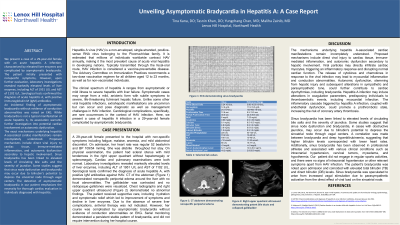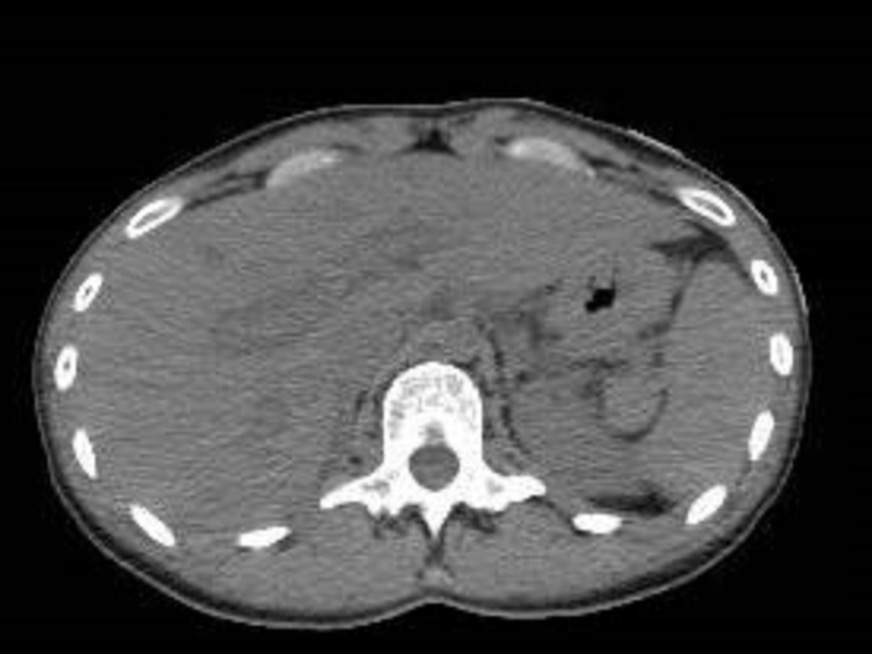Monday Poster Session
Category: Liver
P3119 - Unveiling Asymptomatic Bradycardia in Hepatitis A: A Case Report
Monday, October 28, 2024
10:30 AM - 4:00 PM ET
Location: Exhibit Hall E

Has Audio
- TK
Tina Kana, DO
Lenox Hill Hospital, Northwell Health
New York, NY
Presenting Author(s)
Tina Kana, DO, Tasnin M. Khan, DO, Yunghang Chan, MD, Maliha Zainib, MD
Lenox Hill Hospital, Northwell Health, New York, NY
Introduction: Hepatitis A infection is a global health concern, with an estimated 1.4 million cases, annually. Cardiac complications associated with hepatitis are not often discussed in current literature. While bradycardia is not a typical manifestation of acute hepatitis A, it's association warrants further investigation into potential cardiac involvement or autonomic dysfunction. Here, we present a case demonstrating this unique association and discuss it's implications.
Case Description/Methods: A 29-year-old female presented to the hospital with non-specific symptoms including fatigue, malaise, anorexia, and mild abdominal discomfort. Upon further evaluation, laboratory investigations revealed markedly elevated levels of liver enzymes, including alanine aminotransferase of 1951 U/L and aspartate aminotransferase of 1102 U/L. Serological tests confirmed the diagnosis of acute hepatitis A, with positive immunoglobulin M (IgM) antibodies against HAV. The patient received supportive care, including adequate hydration and symptomatic relief for abdominal discomfort which led to gradual improvement of symptoms and decline in liver enzymes. Due to the absence of severe liver complications, antiviral therapy was not indicated. However, her course was complicated by asymptomatic bradycardia. The incidental finding of asymptomatic bradycardia without evidence of conduction abnormalities was noted on electrocardiogram. Serial ECG monitoring demonstrated a persistent stable pattern of bradycardia, which did not require intervention during her hospital course.
Discussion: The exact mechanisms underlying hepatitis A-associated cardiac manifestations remain incompletely understood. Proposed mechanisms include direct viral injury to cardiac tissue, immune-mediated inflammation, and autonomic dysfunction secondary to hepatic involvement. Sinus bradycardia has been linked to elevated levels of circulating bile salts and the severity of jaundice. Some studies suggest that sinus node dysfunction and bradycardia may occur due to bilirubin's potential to depress the sinoatrial node through vagal centers. The detection of asymptomatic bradycardia emphasizes the necessity for thorough cardiac evaluation in individuals diagnosed with hepatitis A, particularly in the absence of traditional risk factors for cardiac dysfunction. While the significance of asymptomatic bradycardia remains uncertain, it raises concerns regarding potential cardiac complications and underscores the need for vigilance and regular cardiac monitoring.

Note: The table for this abstract can be viewed in the ePoster Gallery section of the ACG 2024 ePoster Site or in The American Journal of Gastroenterology's abstract supplement issue, both of which will be available starting October 27, 2024.
Disclosures:
Tina Kana, DO, Tasnin M. Khan, DO, Yunghang Chan, MD, Maliha Zainib, MD. P3119 - Unveiling Asymptomatic Bradycardia in Hepatitis A: A Case Report, ACG 2024 Annual Scientific Meeting Abstracts. Philadelphia, PA: American College of Gastroenterology.
Lenox Hill Hospital, Northwell Health, New York, NY
Introduction: Hepatitis A infection is a global health concern, with an estimated 1.4 million cases, annually. Cardiac complications associated with hepatitis are not often discussed in current literature. While bradycardia is not a typical manifestation of acute hepatitis A, it's association warrants further investigation into potential cardiac involvement or autonomic dysfunction. Here, we present a case demonstrating this unique association and discuss it's implications.
Case Description/Methods: A 29-year-old female presented to the hospital with non-specific symptoms including fatigue, malaise, anorexia, and mild abdominal discomfort. Upon further evaluation, laboratory investigations revealed markedly elevated levels of liver enzymes, including alanine aminotransferase of 1951 U/L and aspartate aminotransferase of 1102 U/L. Serological tests confirmed the diagnosis of acute hepatitis A, with positive immunoglobulin M (IgM) antibodies against HAV. The patient received supportive care, including adequate hydration and symptomatic relief for abdominal discomfort which led to gradual improvement of symptoms and decline in liver enzymes. Due to the absence of severe liver complications, antiviral therapy was not indicated. However, her course was complicated by asymptomatic bradycardia. The incidental finding of asymptomatic bradycardia without evidence of conduction abnormalities was noted on electrocardiogram. Serial ECG monitoring demonstrated a persistent stable pattern of bradycardia, which did not require intervention during her hospital course.
Discussion: The exact mechanisms underlying hepatitis A-associated cardiac manifestations remain incompletely understood. Proposed mechanisms include direct viral injury to cardiac tissue, immune-mediated inflammation, and autonomic dysfunction secondary to hepatic involvement. Sinus bradycardia has been linked to elevated levels of circulating bile salts and the severity of jaundice. Some studies suggest that sinus node dysfunction and bradycardia may occur due to bilirubin's potential to depress the sinoatrial node through vagal centers. The detection of asymptomatic bradycardia emphasizes the necessity for thorough cardiac evaluation in individuals diagnosed with hepatitis A, particularly in the absence of traditional risk factors for cardiac dysfunction. While the significance of asymptomatic bradycardia remains uncertain, it raises concerns regarding potential cardiac complications and underscores the need for vigilance and regular cardiac monitoring.

Figure: Figure 1: CT abdomen demonstrating nonspecific periportal edema
Note: The table for this abstract can be viewed in the ePoster Gallery section of the ACG 2024 ePoster Site or in The American Journal of Gastroenterology's abstract supplement issue, both of which will be available starting October 27, 2024.
Disclosures:
Tina Kana indicated no relevant financial relationships.
Tasnin Khan indicated no relevant financial relationships.
Yunghang Chan indicated no relevant financial relationships.
Maliha Zainib indicated no relevant financial relationships.
Tina Kana, DO, Tasnin M. Khan, DO, Yunghang Chan, MD, Maliha Zainib, MD. P3119 - Unveiling Asymptomatic Bradycardia in Hepatitis A: A Case Report, ACG 2024 Annual Scientific Meeting Abstracts. Philadelphia, PA: American College of Gastroenterology.
